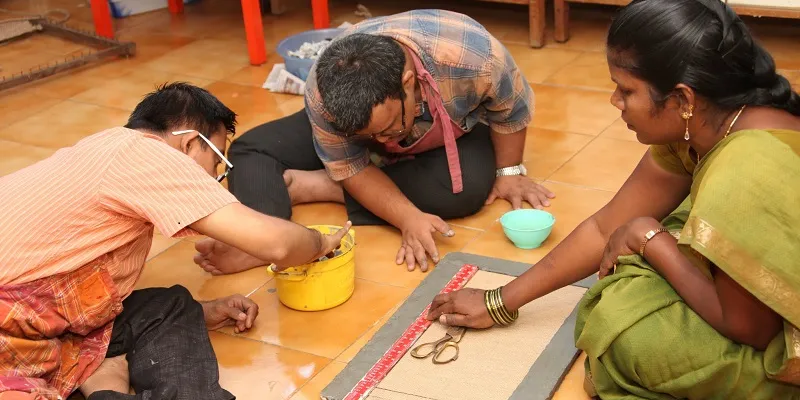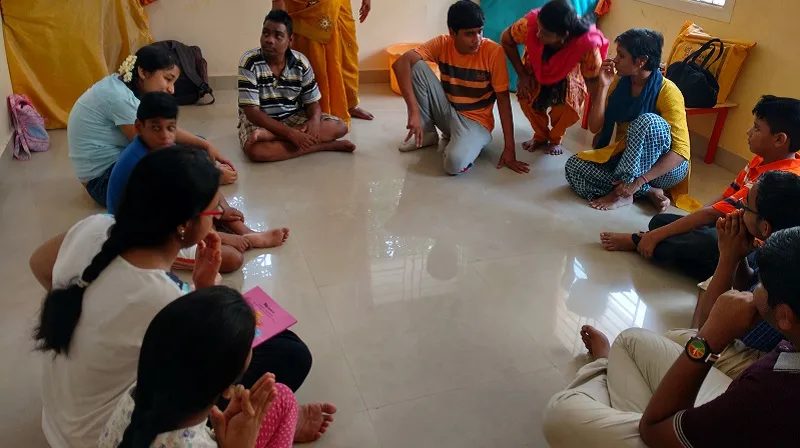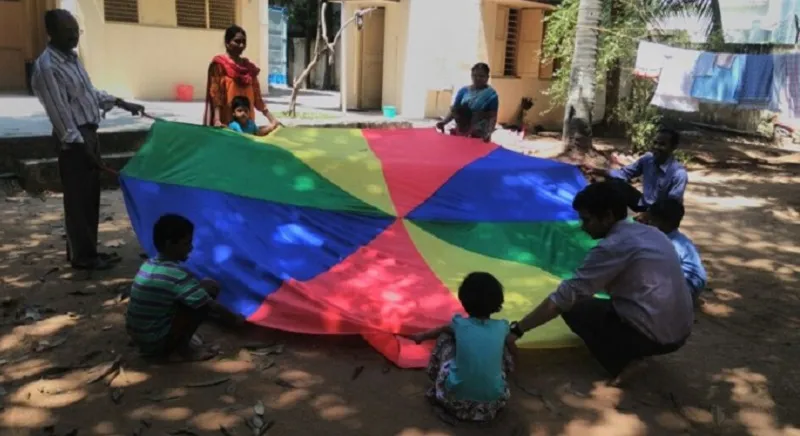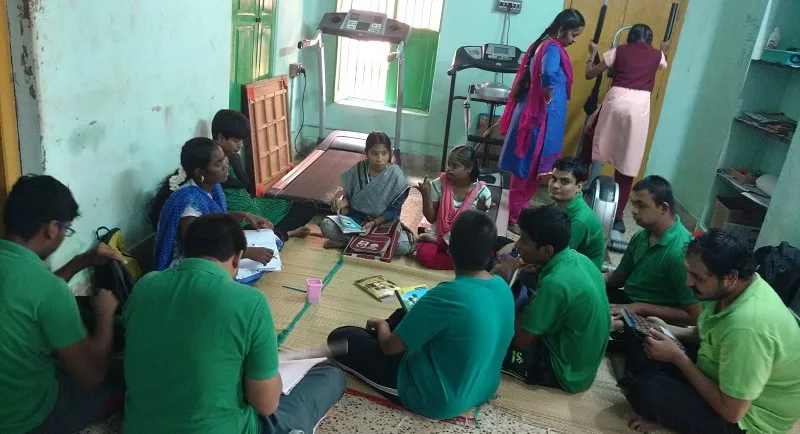This teacher left the US to start an NGO, 35k people with special needs empowered
From early intervention to providing employment, V-Excel Educational Trust takes care of the medical, educational and vocational needs of differently-abled individuals

What started as a small learning centre with just 11 students is now a registered charitable trust that has impacted over 35,000 individuals with special needs across urban and rural areas. V-Excel Educational Trust was founded in 2001 by Vasudha Prakash, who is a professional academician and counselor, with a doctorate in Special Education from Rutgers University, New Jersey.
Vasudha always wanted to work in the education sector in India. Even when she was in the US, pursuing her doctorate studies, she would base her research papers on India, trying to understand the status of special education here.
After Vasudha moved to India, she made an appearance on a TV programme that garnered a lot of attention from parents, who brought to her notice that there weren’t enough schools or services for special children. After doing some research, she went on to start V-Excel.
"Now V-Excel has nine satellite centres across India, including Chennai, Tirunelveli, Erode, and Nashik. We are called a lifespan education centre, which means we start with early intervention and see the person through, right up to employability or sheltered workshop".
We provide whatever therapy is needed, except for speech therapy, because we deal with a lot of autistic individuals, and autism is not really a speech problem. But for children with mental condition and learning disabilities, who have speech problem, we refer them out, says Vasudha.

Right to inclusive education and employment
According to the Persons with Disabilities Act, 2016, Government-funded educational institutions as well as government-recognised institutions will have to provide inclusive education to children with disabilities. So, Vasudha says,
Now schools have no choice but to become inclusive. No child can be rejected based on a disability, as it is their legal right to be part of an inclusive school.
While every child, including children with disabilities and special needs have the right to education, there is still resistance to inclusion. And this mainly comes from the lack of awareness on how to deal with differently-abled individuals.

In order to create a better understanding for the teachers and regular children in schools, Vasudha and her team provide a detailed explanation on varied subjects — this includes preparing the schools for including special children and teaching regular children how to orient themselves to special children.
When it comes to spreading inclusivity in a workplace, it is quite tough, says Vasudha. She adds,
But we are working towards it. I can safely say that, right now 12 to 13 of our students are ready for placement in an inclusive environment. But we have to prepare the receiving party, hold their hand in this process, for at least six months or a year; only then would it be successful.
V-Excel holds workshops to spread the message of inclusivity and help people understand the idea. “We work with more than 100 schools, constantly helping them to understand the concept and method of inclusion. We conduct a three-day workshop called Class Apart with primary and senior school teachers. We conduct workshops for doctors and advise them to refer children with special needs to early intervention, and not to medicate them unless they have seizures or defective medical problems. We also do workshops in the corporate sectors, on parenting,” states Vasudha, who also never misses a chance to talk on various forums.
Overcoming challenges
The biggest challenge that they face is changing the mindset of adults, especially parents and teachers, who start mollycoddling the children.
They hesitate sending their children out into the world, and mollycoddle them so much that they don’t know what their children are capable of doing. I always advise the parents to treat the children age appropriately and support them, she adds.
Another major issue that they face is in terms of finance. Though they get funding from Corporate Social Responsibility (CSR), Vasudha says that they always ask for numbers.

“The intensity of the work we do is so different — we have at least eight people working on one child. So, people should become more aware and understand that regular education is different from special education. As for making CSR understand, we show them what exactly happens at the centre through documentation and videos,” she says, further adding that even finding good resources is an issue. She requests that more and more people join this field.
Programmes and activities
Along with providing early intervention services for children between the age of 0-7, the centre gives importance to education, vocational training and recreational activities. From helping children with developmental disabilities by using art, music, movement, play, occupational therapy to providing remedial intervention for children from regular schools who have difficulty coping with academic and non-academic level expected of their age, they look into all aspects.
They have a Vocational Training Unit, where at a pre-vocational level, the students are given training in car washing, gardening, cooking, carpentry, etc. The students are trained only for placement out in the industry. They have two centres in Chennai devoted to vocational training and production of what their students make, such as bags, mugs, mementos, sanitary pads etc. Vasudha says,
During the pre-vocational level we would know that some students cannot be put in an inclusion path, so they will be shifted to a sheltered workshop path/rehabilitation centre.
Students who are part of the sheltered path are trained in making sanitary napkins, thamboolam bags, umbrellas, and other products. As part of the sheltered workshop, parents are given an opportunity to start their own business.
She adds, We encourage parents to start something of their own on a small-scale level, or we train the children to suit the business of the parent.
For over a decade, the trust has been working under the Sarva Shiksha Abhiyan project of Tamil Nadu Government, and so far, has covered 10 blocks in Villupuram — implementing special education programmes for over 4,500 special children across 680 villages on a monthly basis. Now their focus is on opening centres in tier-2 cities.

Apart from these, students are trained in various activities. The centre has a team called the ‘Blue Blue Sky’ Choir — Vasudha takes the choir team to sing at the assemblies of other schools in Chennai, to spread the message of inclusivity. She also tries to spread the message with the help of their cafeteria called Samarth, which is open on Friday and Saturday, where the students do all the cooking and serving.
The students are also given training in baking, laundry, dry cleaning, making sanitary pads, etc. Besides, they are also taken to art galleries, to teach them art appreciation. Parents also show their active involvement by planning excursions.
In the pipeline
Recently, they started a programme called the IRA teacher training programme that is based on the philosophy of Dr Rudolf Steiner. From parents to teachers, anyone is allowed to take the programme — there is no pre-qualification requirement.
The centre also plans to create a mobile application for an early intervention assessment tool, as Vasudha feels apps have a much better reach.
Lastly, Vasudha plans to open more centres. Her idea was to launch at least 100 centres across India in the first five to six years, but she was afraid that it would be difficult to keep the policy intact. She explains,
Suppose we started a centre somewhere — but maintaining the calibre of a special educator would have been tough. But now that we have standardised a lot of things, we plan to launch 10 to 15 centres in a year. In the next three to four years, you will see a huge number of V-Excel satellite centres.







